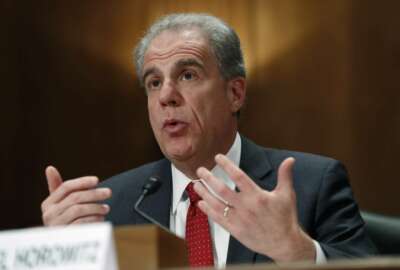DC area Congressman want to make federal telework a permanent option
In today's Federal Newscast, Democratic House lawmakers want to expand federal employee telework for the long-haul.
To listen to the Federal Newscast on your phone or mobile device, subscribe in PodcastOne or Apple Podcasts. The best listening experience on desktop can be found using Chrome, Firefox or Safari.
- The Department of Homeland Security’s intelligence branch is set to get a new leader. The Senate voted 63-35 yesterday to approve Kenneth Wainstein as undersecretary of intelligence and analysis. Wainstein is a lawyer who previously served as Homeland Security Advisor to President George W. Bush. He will have to grapple with morale challenges at the Office of Intelligence and Analysis. The office consistently rates near the bottom of the Partnership for Public Service’s Best Place to Work in the Federal Government rankings.
- The Biden administration must restart its search for a key federal management position. The White House has withdrawn Biniam Gebre as the nominee to be the next administrator of the Office of Federal Procurement Policy. President Joe Biden nominated Gebre in August 2021. He was set to have his nomination hearing in mid-May only for it to be postponed at the request of the White House. A White House official told Federal News Network that Gebre decided to withdraw to pursue other opportunities. The White House now will have to find a new nominee more than 18 months into the Biden presidency. Since 2016, there has been one permanent OFPP administrator. Dr. Michael Wooten was in the position for 16 months before leaving in January 2021.
- A bill giving new authority to the inspector general of the Department of Veterans Affairs is now law. President Joe Biden signed nine veterans-focused bills into law, including the Strengthening Oversight for Veterans Act. It gives the VA IG the authority to subpoena testimony from former VA employees who have left federal service, former contractor personnel, or other individuals during its audits and investigations. IG offices across the federal government have asked Congress for this authority for years. Senate Veterans’ Affairs Committee Chairman Jon Tester (D-Mont.) introduced the bill with Sens. John Boozman (R-Ark.) and Joe Manchin (D-W.Va.).
- The Defense Department’s new chief data and artificial intelligence office takes shape. The CDAO organization reached full operational capability June 1. The organization combines the Joint AI Center, the Defense Digital Service, the DoD Chief Data Officer and other offices under one roof. The organization is coalescing around digital talent. Former DDS Deputy Director Katie Olsen is now deputy CDAO for digital services. “I think it’s an opportunity to replicate and scale the talent and when you give smart people agency to do things, what can happen, and I think the CDAO can be a great vehicle for that,” she said. (Federal News Network)
- A congressional panel wants a look inside how the Defense Department is handling one of its biggest programs. The Joint All Domain Command and Control program or JADC2 is supposed to connect important parts of military equipment together with service members. The end goal is to create a fast command and control system that can deliver data, airstrikes and any other support as quickly as possible. A congressional panel wants to ensure the program is on the right track though. In proposed legislation for the 2023 defense authorization bill, lawmakers want the Government Accountability Office to take a look at the cost, schedule and performance of the program so far. Congressional staff say the report will be focused on alignment and supervision. (Federal News Network)
- The Defense Department is implementing its first-ever early childhood curriculum that will be used at child development centers. Early Learning Matters is a staff-guided program that allows for child-directed play and experiential learning. DoD says the plans meet the National Association for the Education of Young Children’s accreditation standards. Military families can reach out to their on-base childcare center for more information.
- Democratic House lawmakers want to expand federal employee telework for the long-haul. Reps. Gerry Connolly (D-Virg.) and John Sarbanes (D-Md.) introduce a bill to give the Office of Personnel Management more leeway in helping agencies manage telework policies. The Telework Metrics and Cost Savings Act would also require agencies to track how much money telework saves. The lawmakers say telework also improves productivity and employee retention. That also comes as many federal employees report feeling more productive working from home. Several federal unions support the legislation.
- With gas prices soaring, one federal union wants to keep more money in employees’ pockets. The National Treasury Employees Union wants agencies to pay even *more* to their employees based on how far they travel for work-related trips. The federal union calls on the IRS to add a second *mid-year* adjustment to its mileage reimbursement rate due to record high gas prices this spring and summer. The IRS typically adjusts reimbursement rates once a year. The agency initially raised the 2022 rate to 58.5 cents per mile.
- The Internal Revenue Service is telling its non-bargaining unit management workforce that portions of its union-negotiated labor contracts once again cover them. The agency outlined “pass-through” provisions of its 2022 National Agreement with the National Treasury Employees Union that will also apply to agency managers and non-bargaining unit employees. The Professional Managers Association, which represents IRS management says that the IRS suspended pass-through provisions in 2019. The PMA says that made simple tasks like processing a sick leave request subject to several kinds of procedures based on an employee’s bargaining unit status. (Federal News Network)
- The Cybersecurity and Infrastructure Security Agency is partnering with technical experts in the private sector to start the Cyber Innovation Fellowship Initiative. The new program is looking for cybersecurity fellows who can bring new strategies for artificial intelligence, machine learning, post-compromise containment, cloud security and more. The experts will work with teams around threat hunting, incident response and vulnerability management during the four-month program. Nominations to join the fall 2022 program are due by July 8.
- Agencies can feel a bit safer when buying products off the GSA Schedule contract. Through its Verified Vendor Products portal, GSA says it removed about 75,000 items offered by unauthorized suppliers from the GSA Advantage! program. This pilot test helped keep customer agencies from buying counterfeit, fraudulent or otherwise illegitimate products. Moving forward, the agency says it will continue to work with wholesalers and manufacturers to improve ow they represent commercially available off-the-shelf products in the federal marketplace through better images, descriptions, PDFs and other details to help agency buyers continue to purchase with confidence.
Copyright © 2025 Federal News Network. All rights reserved. This website is not intended for users located within the European Economic Area.
Eric White
Eric White is news anchor and Federal Drive producer at Federal News Network.
Follow @FEDERALNEWSCAST
Related Stories
(AP Photo/Jacquelyn Martin)





